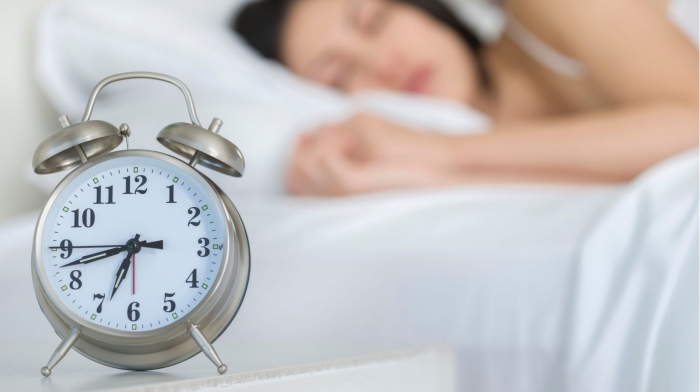The Impact Of Sleep On Health & Wellbeing

We’ve all suffered from lack of sleep from time to time. Getting less than our required 40 winks can leave us feeling tired, groggy, and just a little bit irritable. According to NHS statistics, one in 3 of us suffer from poor sleep, with stress, computers and taking work home often blamed.
As an employer, this is a concern, with lack of sleep having noticeable impacts on overall work place productivity. Figures collated by the UK Government found that the UK economy loses 200,000 working days per year to lack of sleep – leading to a cost of £30 billion!
Read on to discover more impacts of lack of sleep, what the optimum rest time is for a healthy lifestyle, and the positive results of a good night’s sleep.
The Impact of Poor Sleep on Health & Wellbeing
As well as affecting overall employee productivity, lack of sleep can have a number of serious impacts for employee health and wellbeing, which could lead to further problems. For example, studies have found sleep loss and poor-quality sleep lead to accidents and injuries on the job, which could have otherwise been avoided.
Researchers at Harvard Medical School surveyed more than 10,000 people in the U.S. and found that that lack of sleep was responsible for 274,000 workplace accidents and errors each year. This is further supported by data from the UK, where the risk of injury in the workplace increases by as much as 25%-30% for those working night shifts.
Poor quality sleep can also lead to a number of serious health problems for employees, with lack of sleep increasing the risk of conditions such as heart disease, high blood pressure, stroke and diabetes. Adults who sleep fewer than six hours a day have a 13% higher mortality rate than adults who sleep at least seven hours.
Other negative impacts caused by lack of sleep include:
- Poor mental health – sleep, and lack thereof, contribute greatly to overall mental health, with symptoms of anxiety and depression greater in those who sleep less than six hours a night.
- Forgetfulness – poor-quality sleep can impact adult’s ability to process and store long-term memories, leading to increased forgetfulness.
- Weight gain – lack of sleep can lead to increased hunger and appetite, stimulating weight gain amongst adults. This can lead to increased chance of health issues.
How Much Sleep Should We Be Getting?
There is no definitive answer to this question, with sleep requirements varying from person to person. However, we commonly us need around 8 hours of good-quality sleep a night to function properly.
If you’re finding your employees are frequently tired, and suffering from symptoms associated with poor-quality sleep, it’s likely that they need to increase the number of hours spent per night sleeping.
Benefits of Quality Sleep on Health & Wellbeing
From assessing the negative impacts that poor sleep can have on employee health and wellbeing, it’s easy to see the benefits that a good night’s sleep can have for your people:
- Improved mental wellbeing: with mental health in the workplace a concern for a large number of employers, there is a drive to find methods to alleviate the problem. Surveys have found that a number of people suffering with anxiety and depression slept for less than six hours a night – getting the right amount of hours sleep leads to improved mental wellbeing.
- Health condition prevention: as we’ve seen, lack of sleep can cause a number of serious health problems including heart disease, high blood pressure, stroke and diabetes. Improved sleep per day can also lead to greater immunity from common illnesses such as cold and flu, thanks to less disruption for the immune system.
- Greater productivity: with 200,000 working days lost per year due to lack of sleep, being well rested will lead to employees feeling more alert, motivated and productive – improving business output.
How to Encourage a Better Sleep Culture in the Workplace
We all naturally feel tired at two different times of day: 2pm and 2am. Whilst, the majority of workers benefit from a day shift, which allows for greater periods of rest, there are 3.2 million night workers in the UK who are at more risk to the impacts of poor quality sleep.If your business is one that utilise night shift workers, it’s imperative that practices are in place to ensure employee wellbeing associated with sleep. This could include:
- Increased, or set, break times that must be followed.
- Reduced shift hours to mitigate the increased chances of accidents in the workplace.
- Delegation of fewer projects to reduce stress and allow for greater focus on activities.
To encourage a greater sleep culture for all employees, you can:
- Limit working hours: creating boundaries can be an excellent way to improve employee wellbeing by reducing the time spent at work. For example, companies such as Volkswagen have implemented a rule to shut off access to their email servers at 5 p.m.
- Provide flexible working: ensure a greater employee work-life balance by allowing greater flexibility and control for your people over how they manage their time. For example, if an employees may choose to work later in to the evening, to allow for a later start in the morning to achieve a longer time spent asleep than under a traditional working schedule.
- Allow napping on the job: this may seem counterproductive to job productivity, but if your employees are tired, than their productivity will be low throughout the entire day regardless. £billion businesses, such as Google, have seen the benefits of allowing employees to sleep on the job, providing on-site napping quarters.
For more information on this, take a look at the following link How Much Sleep Do I Need? Recommended Sleep Times 2020 (sleepadvisor.org)
Ready to take the next step with Meee?
Download the ‘MyMeee’ app (available on iPhone/Apple or Android/Google), explore our books, listen to our 'Just Meee' podcasts and subscribe to our monthly newsletter, ‘Meee Moments’, for exclusive tips, inspiring stories, and updates to keep you on track with your journey!
At Meee, we’re dedicated to inspiring everyone, everywhere, every day to Find, Live, and Give their unique Magic. As Magic Makers, we have the power to transform ourselves, our organisations, and our communities. Together, we can build a better world. Join us on this journey and be part of the change. Just ask@meee.global


